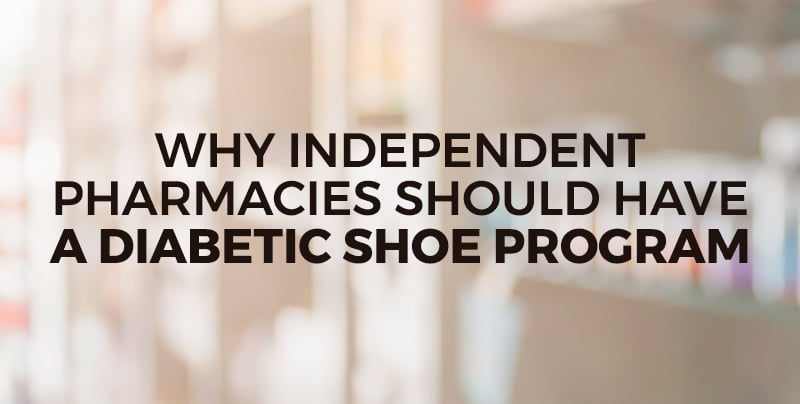Why Independent Pharmacies Should Have a Diabetic Shoe Program

Regardless of the ailment, independent pharmacies should always be asking the same question: How can we best serve the market and the patients who are suffering? When it comes to diabetes, there absolutely is a market for products and services. It’s estimated that more than 100 million adults in the United States have diabetes or prediabetes, and that estimate is getting larger by the year.
Diabetes is a chronic and prevalent medical illness that often leads to circulatory problems, stroke, heart disease, kidney disease, and even blindness. Filling prescriptions for diabetes medications is a start, but independent pharmacies should be doing more to serve the diabetes patient market. Pharmacies can provide education and resources to better help patients manage their disease and even protect them from related medical problems. However, independent pharmacies should also consider offering non-prescription diabetes products, like a diabetic shoes.
A diabetic shoe program, when combined with other ancillary services, can directly impact margins for independent pharmacies. Improving your margins is still a product of the number of prescriptions filled, but aggressively marketing these additional services can attract and secure additional customers. Big box pharmacies typically don’t offer diabetic shoes, giving independent pharmacies an edge with this demographic. Expanding your pharmacy’s diabetic care services leads to healthier patients and better margins, so it’s a true win-win situation.
So, how does an independent pharmacy develop a diabetic shoe program? Let’s explore the subject.
The Basics of Diabetic Shoes
One diabetic shoe prescription, which normally includes two shoes and three pairs of inserts, can mean more than $200 of revenue for a pharmacy. However, many pharmacies do not offer diabetic shoes, even though they are the only preventative product covered by Medicare and Medicaid. So, who is actually eligible to receive a diabetic shoe prescription? In addition to being diabetic, Medicare patients must also exhibit at least one of five conditions:
- Poor circulation of the feet
- A partial or complete foot amputation
- A history of foot ulcers
- Foot deformities
- Neuropathy with callous formations
Diabetic shoes are specifically designed for patients who exhibit the above conditions. These shoes, and shoe inserts, drastically reduce the risk of skin breakdown in diabetic patients. Diabetics are often unaware of how prone their feet are to injuries. Complications from diabetes can lead to strain, calluses, ulcers, misshapen feet, and even amputations.
These highly specialized shoes must be prescribed and are fitted with removable orthoses such as arch supports, inserts, lifts, heels, and wedges. Diabetic shoes and their custom-molded inserts combine to prevent foot injuries and improve mobility for the wearer.
How Can Your Pharmacy Find a Diabetic Shoe Supplier?
Finding a diabetic shoe supplier is an important part of the process, for obvious reasons. Some independent pharmacies may want to go through their wholesaler, but suppliers like Dr. Comfort and Apex are great options. Dr. Comfort, for example, helps independent pharmacies prepare to offer a diabetic shoe program. Pharmacy employees can take their class, which has been approved by the American Board for Certification in Orthotics, Prosthetics & Pedorthics (ABC), and earn a certification that helps them assess a patient’s needs and ensure a proper fit. This type of training is necessary for independent pharmacies since the employees learn patient evaluation techniques, documentation, diabetic foot complications, anatomy of the foot, and more.
How to Stay Compliant with Medicare
Medicare patients are permitted one pair of shoes and three pairs of inserts each year (though some insurance companies permit new shoes every six months). If a independent pharmacy wishes to be reimbursed through Medicare, it must first enroll in CMS-855S, which allows them to bill for non-accredited drugs and/ or durable medical equipment (DME), including diabetic shoes.
Submitting an application for CMS-855S comes with a cost of $631. All applications are processed by National Supplier Clearinghouse (NSC), and the enrollment process can take three to four months. Any pharmacy that wishes to start a diabetic shoe program should be well aware of this lengthy process. A diabetic shoe program can’t be set up in a week or even a month; it takes several months of careful planning.
The CMS-855S application itself is also very long, and it isn’t always obvious what information is required for independent pharmacies. If your application is rejected, you’ll have just 30 days to correct any errors. Otherwise, the enrollment process starts again, and your pharmacy is out another $631.
Though getting started takes some time, the most challenging aspect of maintaining a successful diabetic shoe program is ensuring proper documentation and staying abreast with new regulations. Since diabetic shoes have a high reimbursement rate, audits are common. Luckily with some regulatory changes in recent years, the paperwork process has been greatly reduced. Audits can be easy enough to deal with as long as you have the proper documentation. These documents include the original prescription, a detailed written order (DWO), a physician certification for therapeutic footwear, clinical notes, and an initial and final assessment.
What Does Your Pharmacy Need to Start a Diabetic Shoe Program?
A diabetic shoe program is an additional revenue stream that also increases foot traffic, which is very beneficial for independent pharmacies. Whether your pharmacy is already dispensing diabetic shoes or is just beginning the process, R.J. Hedges & Associates can help.
R.J. Hedges has worked with many independent pharmacies that have had trouble applying for CMS-855S or handling audits. Let us handle the difficult parts of starting and running a diabetic shoe program. R.J. Hedges provides:
- All the required documentation, which can be used for any manufacturer
- Detailed diabetic shoe fitting assessments
- Processes that ensure compliance with audits and evolving Medicare regulations
- Web-based training
Our certified experts take a hands-on approach when working with independent pharmacies as they implement diabetic shoe programs. Contact us today to learn more, or begin enrollment for your pharmacy’s diabetic shoe program.

